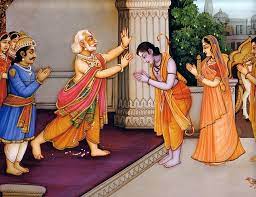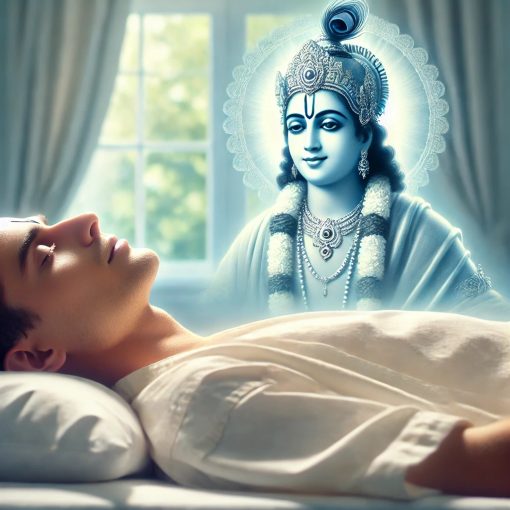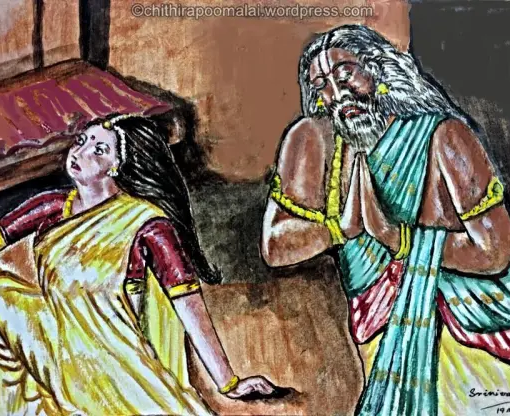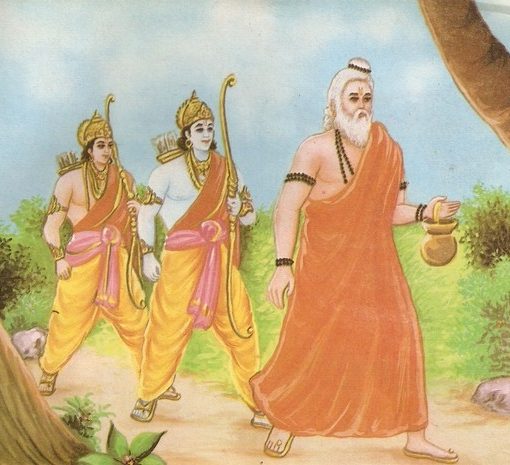

The aging Daśaratha, thinking of his retirement, gradually entrusted more and more of the state affairs to Rāma and Lakṣman. Those two princes, along with Their wives, served the king in every way. They always thought of the welfare of the people. Everyone became pleased with Their disposition and conduct. They were gentle and kind, but firm when necessary. They demonstrated complete mastery of the military arts and, having slain the powerful Rākṣasas even while boys, were respected as great heroes.
Rāma was especially dear to the king and the people. He was always tranquil and soft-spoken, not retorting even when someone spoke harshly to Him. He recognized the smallest of services rendered and did not take to heart any wrongs against Him. Rāma had conquered anger and was full of compassion. Making all arrangements to protect the people, he surrounded Himself with intelligent advisors and never made a decision without due consultation. Despite His power and ability, He always remained humble, mild and self-controlled. He was not influenced by envy or hatred, did not engage in frivolous talks and always sought the good in others. Free from sloth, He was ever vigilant to carry out His duty.
Rāma gave delight to even the gods, who would frequently grace Ayodhya with their presence. He was as tolerant as Mother Earth, as wise as Bṛhaspati, and as valorous as Indra. His personal beauty was as resplendent as the brilliant sun-god.


Daśaratha, seeing his son endowed with so many virtues, longed to see Him installed as the Prince Regent. The king discussed his desire with his ministers and priests. They all unanimously agreed that Rāma, as the eldest son, was the rightful heir to the throne and that He would be the most popular choice of the people. However, when the royal astrologers were calculating a favorable time for the coronation, they discovered dreadful signs in the heavens, portents that indicated that some calamity would soon occur.
Daśaratha became concerned. The omens must surely foretell of his own impending death. He decided to perform the ceremony quickly at the earliest opportune moment. Having set a date for Rāma’s installation, he summoned to Ayodhya rulers and important men from around the globe. But the gods so arranged that Daśaratha, in his haste, neglected to invite King Kushadhvaja. Thus neither Bharata nor Shatrughna came for the ceremony. Daśaratha realized too late his omission, for it was a journey of some days to Rajagriha. Nevertheless, he considered that his two absent sons would soon receive the delightful news of Their elder brother’s installation. He felt sure They would be overjoyed and would not take offense.
Soon a large gathering of kings and Brahmins appeared in Ayodhya and Daśaratha had them assembled in the royal court. Sitting in state in the assembly, the emperor blazed forth like Indra in the midst of the gods. He spoke in a pleasing and melodious voice, which was at the same time sonorous and grave.
“All of you know how the earth has long been protected by me and the kings who previously appeared before me in my line. To the best of my ability I have ruled the people, giving protection even at the expense of personal comforts. My body has become worn out in the shade of the royal umbrella. Carrying on my shoulders the burden of governing the globe, I have become old. I wish now to bestow this kingdom upon one well suited to take my place. Here is my beloved and eldest son Rāma, who vies with the king of the gods in all virtues. With the agreement of my closest advisors and in accordance with custom and law, I desire to place Rāma at the head of the state. With your permission, therefore, the ceremony will take place tomorrow morning.”
“Rāma, who possesses every desirable quality, will be your worthy protector and even the universe will be better ruled with Him as emperor. If my plan finds favor with you, then be pleased to give your consent. Otherwise, if you consider that some other course should be taken, then speak out. Perhaps you may find me overly attached to Rāma, choosing Him when a better choice could be found. The views of the dispassionate are always to be sought when deciding a difficult issue.”
The whole assembly was filled with delight upon hearing Daśaratha speak. They erupted with loud acclamations of joy, even as a crowd of peacocks would acclaim the appearance of a large rain cloud. The sound echoed all around Ayodhya, seeming to shake the earth. “Let it be so! Let it be so!” was heard everywhere, and every man was in agreement.
Stepping forward, a leader of the Brahmins said, “You have long protected us with love, O king. Now you have a worthy son and can retire peacefully. Pray install Rāma as the Prince Regent, for He alone deserves to be your successor. We long to see Rāma riding upon the great royal elephant, His head shielded by the white umbrella.”
Upon hearing the assembly voice their unanimous agreement to Rāma’s installation, Daśaratha stood up, his eyes flooded with tears of joy. “It is fortunate for me and indeed the world that you all wish to see Rāma succeed me as king. This confirms my decision. I shall begin the arrangements for Rāma’s installation immediately.”
Daśaratha came down from his throne and approached Vasiṣṭha, touching his feet. “With your permission, O holy Brahmin, we shall proceed with the ceremony tomorrow. If you are agreeable, then please make all preparations.”
“So be it,” Vasiṣṭha replied, and he immediately commanded the king’s ministers to set about making ready all of the items required for the installation the following day. The assembly then dispersed with a loud clamor, and shouts of “Victory to Rāma!” were heard everywhere.
That night, however, Daśaratha remembered the astrological predictions. He became fearful and called for Rāma. Speaking with Him in private, Daśaratha said, “I have enjoyed a long life and have always protected the people to the best of my ability. In thousands of religious ceremonies, I have bestowed abundant charity. By sacrifice, worship and charity I have repaid my debt to the gods, the Brahmins and the forefathers. I have also fully satisfied myself through the enjoyment of numerous pleasures. All that remains for me to do is to install You as my successor.”


“My dear Rāma, due to seeing all these omens, Your installation has been sought swiftly by me before any problems arise. With Your good wife, Sītā, make offerings into the sacrificial fire tonight. At sunrise tomorrow we shall commence the installation ceremony.”
Rāma nodded in agreement and then bowed and took His leave from the king. He went back to His palace and, along with Sītā, sat before the sacrificial fire making offerings to Viṣṇu.
Reference: – Vedabase/Ramayana/Chapter 5





